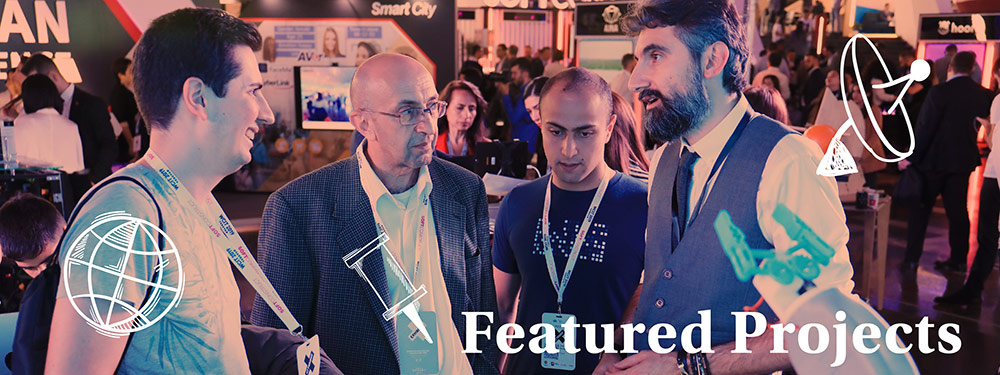
Science Creates New Knowledge
CYBER SECURITY: Security of Samsung Corporation Video Devices Developed at ERC
An ERC team has completed security solutions for Samsung Corporation of South Korea. The Principal Investigator (PI), Dr. Gurgen Khachaturyan, developed an algorithm to be used in many Samsung video devices to protect against hacker attempts to place viruses and other unauthorized information onto devices and remain undetected. The project developed a fast and secure integrity checking solution.
CYBER SECURITY: Cutting-edge cryptography research funded by the Volkswagen Foundation
ERC, in collaboration with Dr.Han Vinck of the University of Essen in Germany, worked on a two-year contract from the Volkswagen Foundation in the field of error-control coding and cryptography. The project engaged talented students and provided them with the opportunity to connect with leading scientists in the field. The research project, led by Dr. Gurgen Khachatryan, focused on biometric verification, technology that enhanced digital security and authentication. This leading technology is in great demand in the face of increasing threats of hackers, identity-theft, and other digital crime.
CYBER SECURITY: NTX Biometric Password
Dr. Gurgen Khatchatryan with a team of AUA students completed a Java code for user-client secure authentication for the French company NTX. The team also worked on a second phase of the project that uses the cryptographic Hash algorithm called Erindale+ to develop further security solutions for NTX.
Industrial Cooperation and Creative Engineering based on Remote Engineering and Virtual Instrumentation
Eleven universities from Armenia, Austria, Georgia, Germany, Romania, Spain, and Ukraine were engaged in a Tempus IV project entitled Industrial Cooperation and Creative Engineering based on Remote Engineering and Virtual Instrumentation, shortly – iCo-op. The goal of this international 3-year project was to “Empower university-enterprises partnership in Armenia, Georgia, and Ukraine by modernizing engineering education based on remote engineering and virtual instrumentation.”
INDUSTRIAL ENGINEERING: U.S. National Renewable Energy Laboratory Grant Completed
ERC completed a research project for the U.S. Department of Energy’s National Renewable Energy Laboratory (NREL). The multi-year project required the design and prototyping of a laser-probe system that allows for real-time detection of defects in solar cells made from silicon wafers. The equipment can be used for quality control during the manufacturing process or as an instrument for researchers investigating the causes of defects in the crystalline material during the production process.
ENERGY EFFICIENCY: College of Science & Engineering Developing Hybrid Space and Water Heater with ITC
The Engineering Research Center (ERC) completed a project entitled “Development of a Solar and Natural-Gas Driven Hybrid Water and Space Heating System.” The project was funded by Industrial Technologies Co. (ITC), an Armenia-based engineering and product-development company. Three CSE students were competitively recruited to participate in this project.
ALTERNATIVE ENERGY: Renewable Energy Roadmap for Armenia
Drs. Ken Touryan and Artak Hambaryan of ERC participated in a comprehensive analysis of renewable energy options for the Republic of Armenia. They identified the renewable energy resources available to Armenia and the steps necessary to reach high levels of adoption for these solutions by 2020. The work was funded by R2E2 Fund under a World Bank grant and was contracted to the Danish Energy Management, a consulting firm based in Copenhagen.
Advanced CAD/CAM Applications for Companies in Armenia
Ara Yeressian (CIS ’12) and Babken Chugaszyan (IESM ’12) collaborated with National Instruments (NI) engineers to create a 3D model of an engineering training stand. The stand is expected to be offered by NI’s Armenia office to educational institutions for teaching various types of mechanical transmission as well as to examine their dynamic, structural, and thermal characteristics. In addition, Flora Matsakyan (IESM ’12) and Arsen Balagyozyan (IESM ’12) designed a universal container for vegetable freight that is made of polystyrene. The student team also designed the molds to be used to manufacture the polystyrene freight containers. The design need originated from SPAYKA LLC, a freight-forwarding company that stores, packages, and transports agricultural products internationally.
